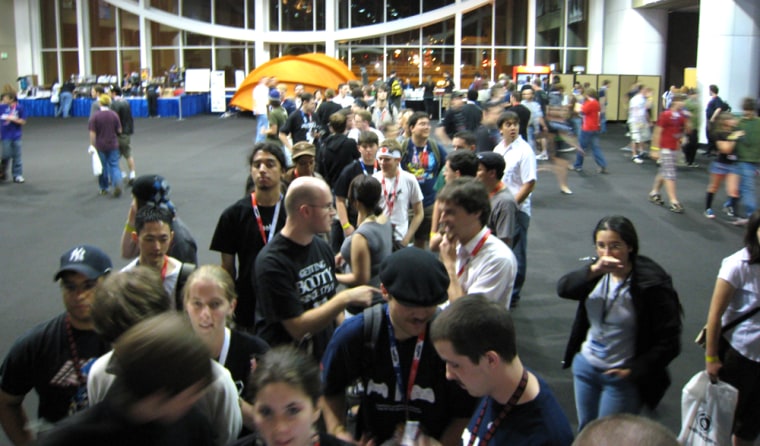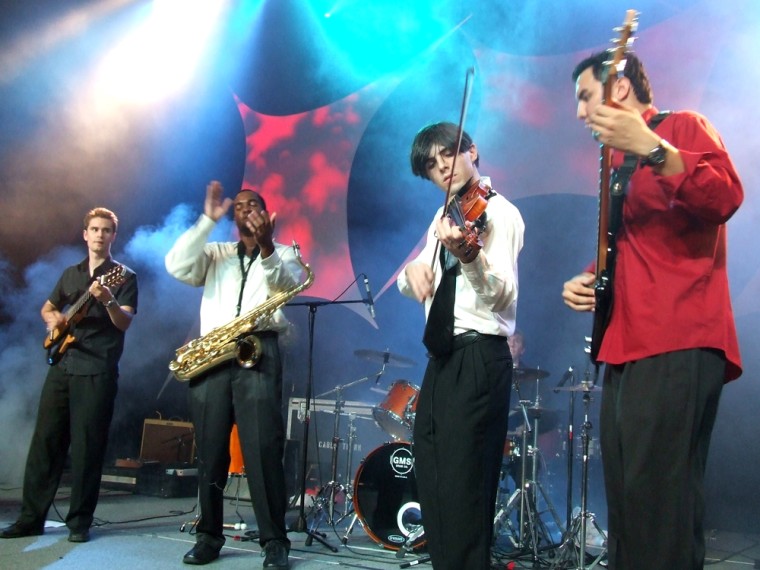On the first night of this year’s Penny Arcade Show in Seattle, scores of gamers gathered to hear the OneUps. Not many in the audience had ever heard of the seven-piece video-game cover band from Fayetteville, Ark.
They’d definitely heard the metal-esque stylings of the NESkimos and the hip-hop MC Frontalot rapping about Goth girls. But who were these dudes with the violins and stuff?
Then the OneUps busted into a super-tight Latin-flavored “Super Mario Bros.,” just like you remember it from 1985. And the crowd of 5,000 went totally nuts.
It was a particularly sweet moment for OneUps founder Mustin, who also plays bass and keyboards. He had been working a long time to get the band — and video game music — the respect he thought it deserved. But until that night, their gigs hadn’t really drawn much of a crowd.
“It’s been so hard just trying to make this thing work,” he says. “And to have all those awesome people in the audience at PAX let me know that it’s finally working…it’s just nice.”
All of the guys in the OneUps are serious musicians. Mustin — just Mustin, kind of like just Bono — plays pretty much every instrument under the sun. Drummer Jared Dunn is also a singer-songwriter. Guitarist William Reyes has a master’s degree in music.
Reyes says he often gets barely concealed disapproval when he tells people he’s in a video-game cover band.
“People smile and say ‘that’s cool,’ but in their mind they’re saying ‘that’s kind of weird,’” he says. “But I like (game music) because it’s nostalgic. And it’s legit — some of it.”
So legit that some audiences have no idea that what their hearing is video-game music, Mustin says. He recalls a fundraising gala where the OneUps played for millionaire donors. After the steak dinner and plenty of wine, one of the attendees came up to tell him how much she appreciated seeing young people playing such “sophisticated music.”
“Only one person, a kid who was working the event said, ‘Hey, did you guys just play Zelda?’” Mustin says.
Mustin, like the other guys in the band, had played a lot of video games as a kid — old-school stuff like “Mega Man 3,” “Super Mario Bros. 2,” and “Final Fantasy IV.” And he realized, as a young musician, how much of the music he made was influenced by video games.
So in 2000, barely out of high school, Mustin and his buddy Dale North (who plays keyboards in the band) started OneUp Studios, named for the life-extending power-ups in video games. Their goal? To put together game-themed albums that would show the world just how cool video game music could be.
Their first album, a tribute to legendary game composer Yasunori Mitsuda, featured a ragtag group of musicians covering music from “Chrono Trigger,” “Chrono Cross” and “Xenogears.” The guys liked playing together so much that they formed a band — the OneUps.
In five years, the band has played plenty of bars, birthday parties and galas. They put out one album, in 2003, called “The OneUps Volume 1.” They have plenty of fans: Mustin says that their annual OneUp Studios Barbeque in Fayetteville draws people from California, New York — and even the Netherlands. But they weren’t getting the big gigs, the big conventions. So in May 2006, Mustin disbanded the OneUps.
“It wasn’t like we hated each other or anything,” he says. “I’m just this crazy entrepreneur with messy hair and I don’t know what I’m doing. I’m just trying to figure out what to do to make (the band) work.”
In February, Mustin got a call from Robert Khoo, director of business development with Penny Arcade. He had heard that the band wasn’t playing together anymore, but would they maybe want to play PAX in August?
“I was running around the room screaming,” says Mustin. The band was back.

After their 23-song set at the show, the line in front of the band’s booth stretched almost all the way back to Arkansas. They sold hundreds of CDs. Fans came up and told them how awesome their music was, how different it was from the usual rock stuff.
Elizabeth Walker, 21, made the trip to PAX from Central Washington University in Ellensburg. She had never heard of the band before that night, but she definitely considers herself a fan now.
“I’m a dork and I like video-game music,” she says. “They picked songs from old-school Nintendo and Super Nintendo games…and it was pretty exciting to hear the way that they’d performed these little electronic songs with real instruments. It was amazing, actually.”
As a result of the performance, the OneUps have been invited to play other conventions, such as Ikkicon, in Austin and AniMix 2008 in Temple, Texas. They got an invitation to play a guy’s birthday party in Chicago, and a girl’s bat mitzvah. But it isn’t easy to ferry seven guys to gigs.
“We’ve lost so much money playing gigs that we traveled to ourselves,” he says. “We’ll play anywhere for free as long as you get us there, and allow us to sell our CD.”
The band hopes to be invited back to play at PAX, and Mustin says they’d like to make a two-disc album and release it at the convention. And Mustin wants to record the entire soundtrack to “Super Mario Kart.”
More than anything, though, the band is excited that people are finally catching on to the fact that video game music can be really magnificent stuff.
“You could be playing ‘Mary Had a Little Lamb’ and if it has a funky groove, people are going to like it,” says guitarist Reyes. “We’ve helped people realize that video-game music can be just as cool as whatever music you normally listen to.”
